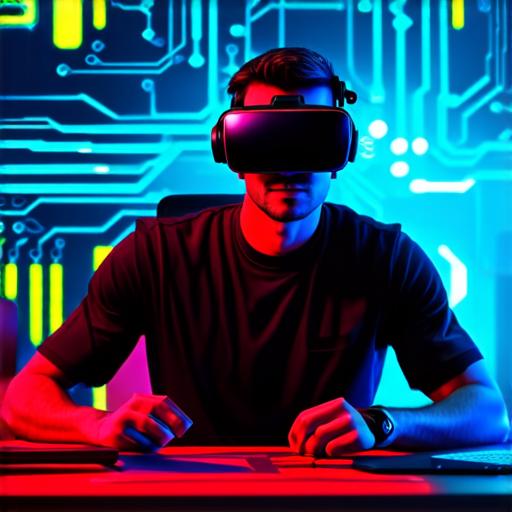The term “meta” is often associated with the concept of reflection or self-awareness. In the field of technology and virtual reality, it has taken on a new meaning that refers to a virtual environment where users can interact with each other and the world around them in unique and innovative ways.
Meta: A Virtual Reality Experience that Transcends the Physical World
The term “meta” was first coined by philosopher Martin Heidegger in his work on the relationship between human beings and their environment. In Heidegger’s view, the meta refers to a higher level of awareness or consciousness that allows us to understand and engage with our surroundings in a more meaningful way.
In the context of virtual reality, the “meta” refers to a digital environment that provides users with a sense of immersion and presence. The metaverse is a term coined by science fiction author Neal Stephenson in his 1992 novel Snow Crash, which described a future world where people could interact with each other and their surroundings through avatars in a virtual reality environment.
The metaverse is not just a fantasy; it is already becoming a reality through the development of advanced virtual reality technologies. Metaverses are being created by companies such as Facebook, which has invested heavily in virtual reality technology, and by independent developers who are building their own immersive digital worlds.
One example of a metaverse is Decentraland, a decentralized virtual reality platform that allows users to create and customize their own avatars and interact with each other in a virtual world. Decentraland is built on the Ethereum blockchain, which provides a secure and transparent way for users to own and control their digital assets.
The Metaverse: A Virtual Reality World that Transcends the Physical Boundaries
The term “metaverse” is often used interchangeably with the term “virtual reality,” but they are not the same thing. Virtual reality refers to a digital environment that simulates the physical world, while the metaverse refers to a virtual world that exists independently of the physical world.
In the metaverse, users can interact with each other and their surroundings in unique and innovative ways that are not possible in the physical world. For example, users can create their own avatars that are not constrained by the limitations of the human body, allowing them to explore new forms of movement and expression.
The metaverse also offers users a platform for creativity and innovation, allowing them to design and build their own virtual worlds and experiences. This has the potential to revolutionize industries such as entertainment, fashion, and education, by providing users with new ways to engage with each other and their surroundings.
Implications of Meta and the Metaverse for Society and Culture
The development of metaverses and virtual reality technologies has significant implications for society and culture. These technologies have the potential to transform the way we interact with each other and our surroundings, providing new forms of expression, creativity, and connection.
One of the most significant implications of metaverses and virtual reality is the potential for these technologies to blur the line between the physical and digital worlds. This has the potential to create a sense of disorientation and confusion, as users struggle to understand where they are and what they are experiencing.
Another implication is the potential for these technologies to exacerbate existing social inequalities. For example, if metaverses become dominated by wealthy individuals or corporations, it could lead to a further concentration of power and resources in the hands of a few. This has the potential to create a more unequal and stratified society.
On the other hand, metaverses and virtual reality also have the potential to bring people together and promote understanding and empathy. By allowing users to interact with each other in unique and innovative ways, these technologies can help break down barriers and foster connections between people from different backgrounds and cultures.
The Future of Meta and the Metaverse: Opportunities and Risks
As metaverses and virtual reality technologies continue to develop, there are both opportunities and risks associated with their use. These technologies have the potential to transform industries such as entertainment, fashion, and education, providing users with new ways to engage with each other and their surroundings.
However, there are also risks associated with these technologies, including the potential for addiction, privacy concerns, and the exacerbation of social inequalities. It is important for policymakers and industry leaders to carefully consider these risks and develop strategies to mitigate them.
One way to do this is through the development of ethical guidelines and standards for the use of metaverses and virtual reality technologies. These guidelines could help ensure that these technologies are used in a responsible and sustainable manner, promoting the well-being of users and society as a whole.

Conclusion
The terms “meta” and “metaverse” refer to technologies that have the potential to transform the way we interact with each other and our surroundings. These technologies offer unique and immersive experiences that can be customized to users’ preferences, providing new forms of expression, creativity, and connection.
However, there are also risks associated with these technologies, including the potential for addiction, privacy concerns, and the exacerbation of social inequalities. It is important for policymakers and industry leaders to carefully consider these risks and develop strategies to mitigate them. By doing so, we can ensure that these technologies are used in a responsible and sustainable manner, promoting the well-being of users and society as a whole.
